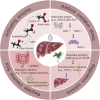Food plants as adjuvant medicines: a review of protective effects and clinical potential in alcoholic liver disease
- PMID: 40474973
- PMCID: PMC12137275
- DOI: 10.3389/fphar.2025.1586238
Food plants as adjuvant medicines: a review of protective effects and clinical potential in alcoholic liver disease
Abstract
Research background: Globally, alcohol usage is the third-leading risk factor for diseases, and alcohol-induced alcoholic liver disease (ALD) has become a global public health problem. ALD is characterized by oxidative stress and immune damage in the liver caused by excessive alcohol consumption. Furthermore, alcohol and its metabolites disrupt the health of the intestinal tract and cause secondary liver damage through the gut-liver axis.
Existing problems: The underlying mechanisms of ALD are complex. Currently, there are no safe and effective drugs for the prevention and treatment of ALD; some food plants used as medicines (FPUM) have demonstrated promising effects in combating this condition.
Solutions: In this review, we analyze the pathogenesis of ALD and explore the mechanisms of action of certain FPUM in preventing and treating ALD. Different mechanisms include activation of alcohol metabolism-related enzymes, maintenance of mitochondrial stability, reduction of oxidative stress damage caused by alcohol intake, regulation of cytokine levels, and modulation of the gut microbiota. The review also explores potential future research directions and summarizes insights for developing novel therapeutic agents and components.
Future prospects: Future research on FPUM for the treatment of ALD could explore promising avenues such as multi-herb combinations, multi-component formulations, and side effect reduction strategies, demonstrating that the development of herbal medicine still holds boundless potential.
Keywords: alcoholic liver disease; food plants used as medicines; mechanism of action; pathogenesis of ALD; traditional Chinese Medicine.
Copyright © 2025 Li, Zhang, Chen, Hu and Liu.
Conflict of interest statement
The authors declare that the research was conducted in the absence of any commercial or financial relationships that could be construed as a potential conflict of interest.
Figures
References
Publication types
LinkOut - more resources
Full Text Sources




